Trending Now
We have updated our Privacy Policy and Terms of Use for Eurasia Group and its affiliates, including GZERO Media, to clarify the types of data we collect, how we collect it, how we use data and with whom we share data. By using our website you consent to our Terms and Conditions and Privacy Policy, including the transfer of your personal data to the United States from your country of residence, and our use of cookies described in our Cookie Policy.
{{ subpage.title }}
What Tim Walz adds to Kamala Harris' campaign
Jon Lieber, Eurasia Group's head of research and managing director for the firm's coverage of United States political and policy developments, shares his perspective on US politics from Washington, DC.
What we're watching in US Politics: Vice President Kamala Harris, the Democratic nominee for president, has chosen her running mate: Gov. Tim Walz of Minnesota.
Walz is a moderate to center-left Democrat who has presided over a trifecta in Minnesota, meaning the Democrats have controlled the state legislature for several years now. They have passed several “wins” for progressive policy, liberalizing the state's marijuana laws, expanding gun control, and expanding access to abortion. This has made Walz a popular choice with many progressives. He’s also been endorsed by several labor unions as a good pick for Kamala Harris. In reality, though, he probably doesn’t make that much of a difference in the presidential campaign.
Harris herself is running as, sort of, a generic Democrat. She’s been avoiding media interviews, running a lot of campaign ads, and giving a lot of set speeches where she can basically read off a teleprompter and carefully curate the image that she’s putting forward to the American people as the candidate in what’s actually going to be a truncated campaign of only about 100 days.
Walz probably helps her with that. He looks like a pretty nice guy. He delivers a lot of great attack lines on President Donald Trump that have Democrats excited, but the evidence suggests that vice presidential picks really don't make all that much of difference in presidential campaigns. Usually, it’s the person at the top of the ticket, and that person is Harris. She continues to benefit from a couple of great weeks after Biden stepped aside from the nomination, and this race is starting to look significantly more competitive than it did right after the disastrous debate for Biden.
A couple of interesting watch points coming up: One will be a potential debate between Walz and the significantly younger Republican VP candidate, Sen. JD Vance, and then whether or not Harris and Trump themselves will debate. Probably, Trump wants the debate to happen so that he can disrupt Harris’ momentum.
- Kamala Harris narrows the enthusiasm gap. But will it last? ›
- Will market turmoil melt Kamala Harris’s momentum? ›
- Kamala Harris on foreign policy ›
- Who will Harris pick as her VP running mate? ›
- Harris, Trump and the hypocrisy in US politics - GZERO Media ›
- Debate Bingo, VP edition: Tim Walz v. JD Vance - GZERO Media ›
Who will Harris pick as her VP running mate?
Vice President Kamala Harris is the presumptive Democratic presidential nominee, leaving one major question remaining: Who will she choose as her No. 2?
“Harris needs someone who compliments her strengths,” says Eurasia Group’s US director Clayton Allen. “To put it bluntly, a white, male, moderate.” She is also looking for someone who can unify the party, draw in a new coalition of voters, or win in a swing state.
Former Attorney General Eric Holder is reportedly in charge of vetting a list of 10 Democrats being considered for the job.
Josh Shapiro
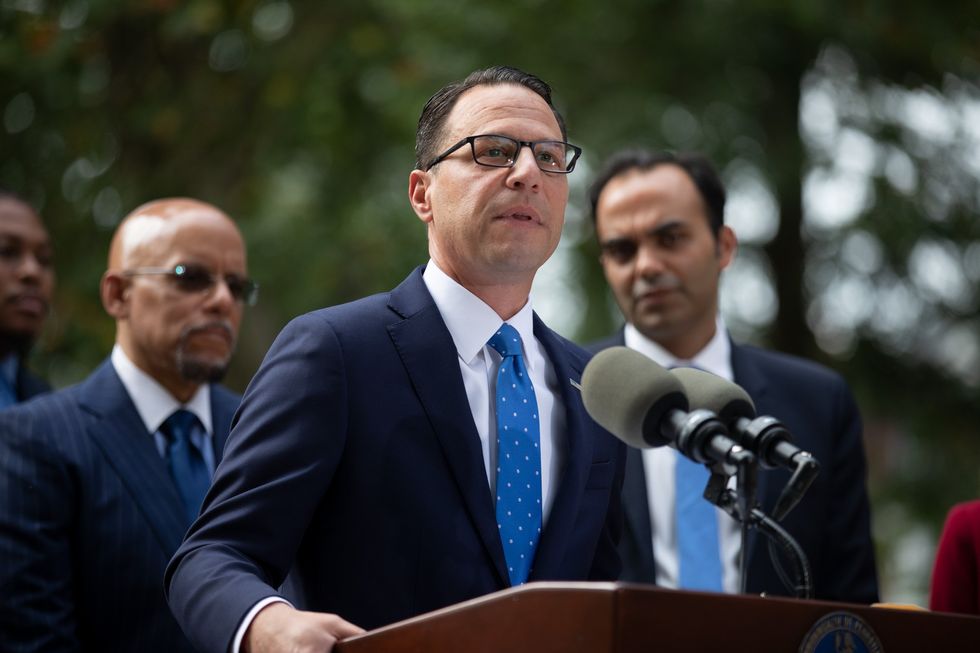
Then-Attorney General Josh Shapiro announces a $20 million settlement with Trident Mortgage Company over redlining allegations, Philadelphia, PA, July 27, 2022.
Credit: United States government
The Pennsylvania governor, a can-do moderate, could help Harris win his state’s 19 electoral college votes by making inroads with rural, potentially Trump-leaning voters. A poll earlier this year showed that more than three in 10 Trump supporters in Pennsylvania supported Shapiro.
Shapiro, who is Jewish, has been an outspoken supporter of Israel’s policy in Gaza and an opponent of campus protests and divestment calls. The extent to which those stances could alienate progressive Democrats is an open question. Shapiro’s support for school vouchers also ran afoul of Pennsylvania’s largest teachers union, an issue that will likely also attract attention.
Mark Kelly
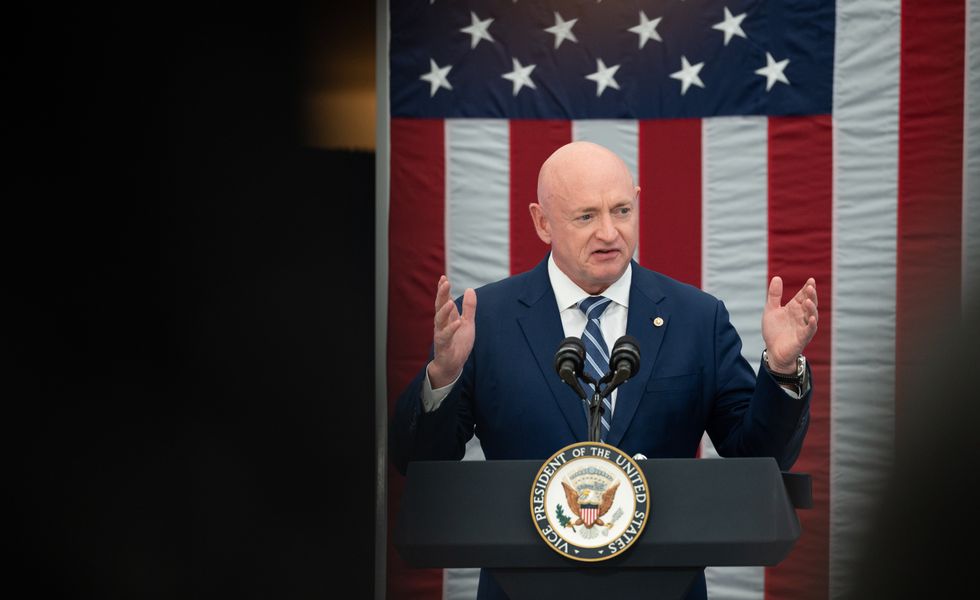
Sen. Mark Kelly, D-Ariz., introduces Vice President Kamala Harris at the first meeting of the National Space Council, United States Institute of Peace, Washington, Dec. 1, 2021.
Credit: NASA/Joel Kowsky
Like Shapiro, the Arizona Senator also hails from a swing state, and his tough stance on border security could help Harris – who was given the southern border as a portion of her issue portfolio – withstand attacks on the administration’s border record. Plus, “he has a nice story,” says Eurasia Group US expert Jon Lieber. “He’s an astronaut and loyal husband to his wife, who was a victim of gun violence.” Kelly is married to former congresswoman Gabrielle Giffords, who was severely wounded in a mass shooting in Tucson in 2011.
His downside: If he ran it would mean abandoning a Democratic Senate seat in a swing state, forcing the Dems to defend it again two years earlier than expected.
Andy Beshear
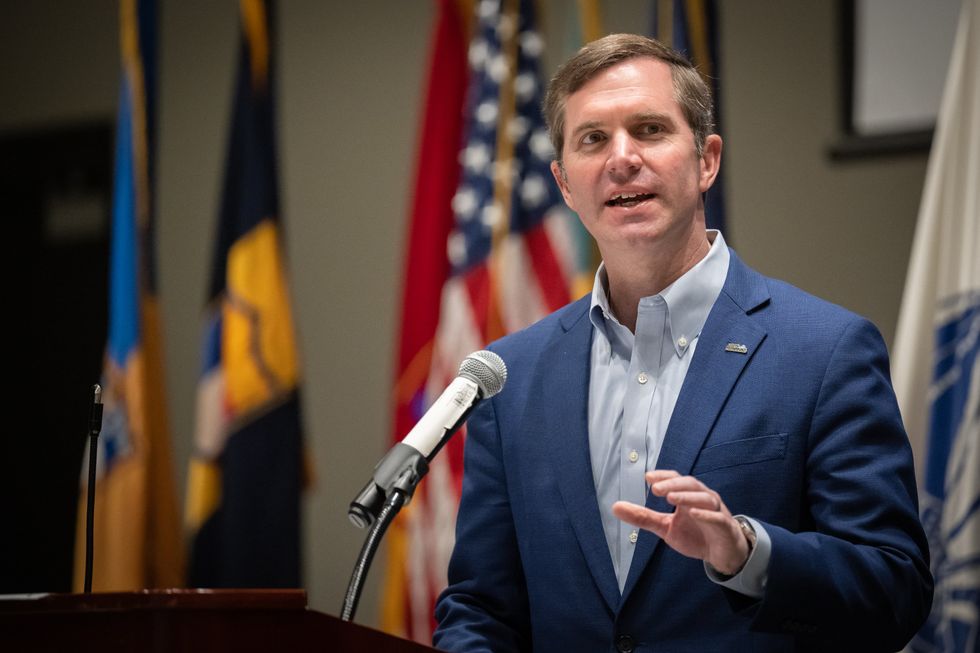
Kentucky Gov. Andy Beshear addresses more than 900 Soldiers and Airmen from the Kentucky National Guard during Leadership Development Day at the Kentucky Exposition Center in Louisville, Ky., Feb. 5, 2023.
Credit: Dale Greer/U.S. Air National Guard
The governor of Kentucky “brings a southern state moderate appeal that boosts Harris’ blue-collar appeal,” says Allen. Beshear has won two terms in a solidly Republican state that Trump won by 26 points in 2020. He is vocal about his Christianity and has emphasized the need to work with Republicans on legislation – traits that could boost Democratic support among moderates and independents. But Trump is almost certainly going to win in Kentucky, putting Beshear at a disadvantage to the other swing-state governors.
Roy Cooper
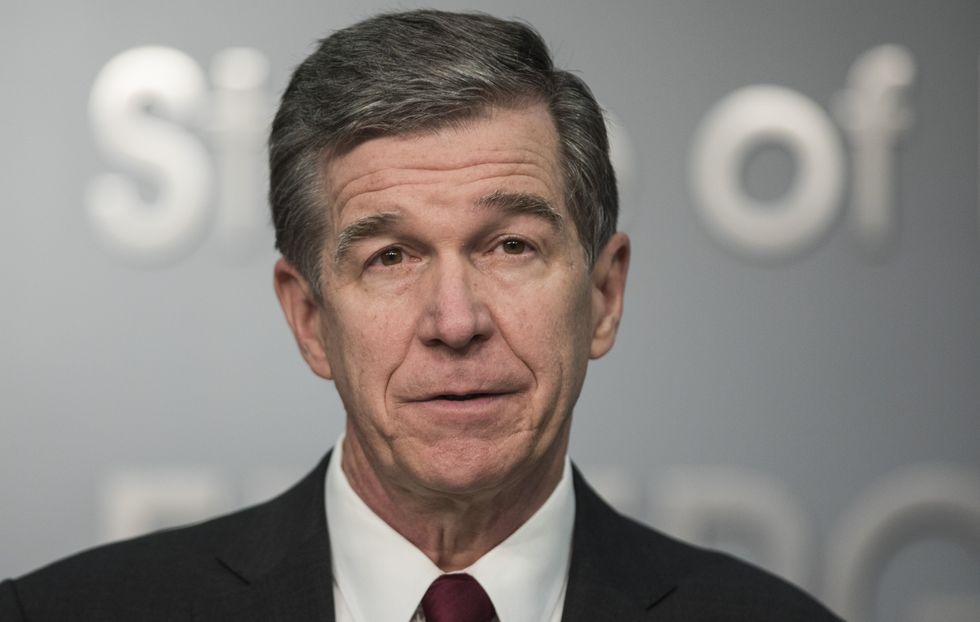
Gov. Roy Cooper speaks about the rise in COVID-19 cases in North Carolina during a press conference in Raleigh, N.C., Oct. 21, 2020.
Credit: NC Dept of Public Safety
At 67, Cooper has had a long political career as the former state’s attorney general and North Carolina senator, making him among the most qualified of the VP picks – but age has proven to be a double-edged sword in this election season. Cooper’s successes as a Democratic candidate in an increasingly Republican state may sweeten his odds for VP in helping turn the Tar Heel State, a key battleground state, blue for the first time since 2008.
JB Pritzker
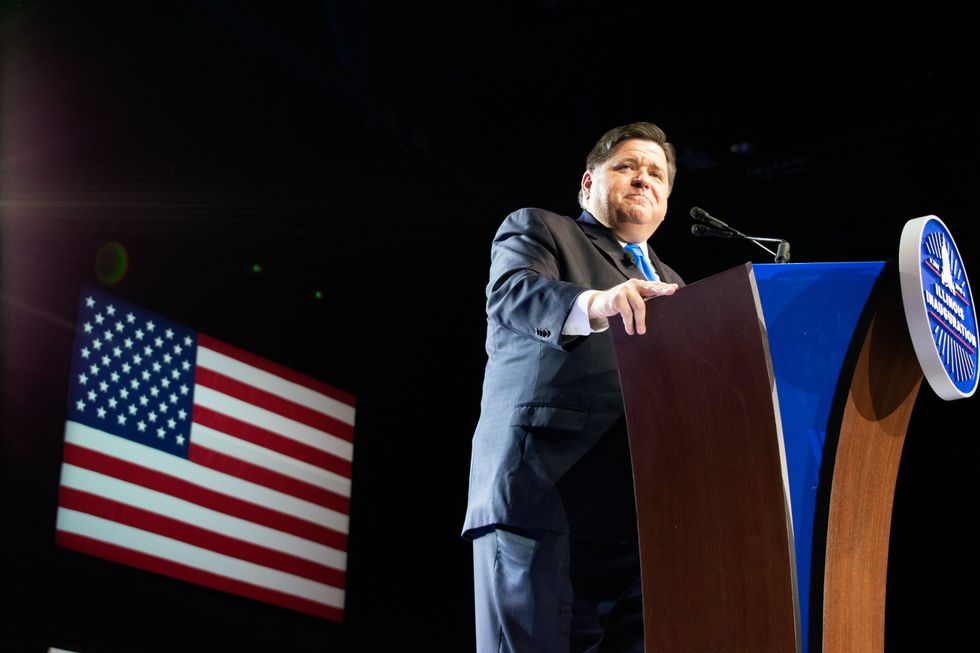
Gov. J.B. Pritzker addresses members of the audience after being sworn into office at the Bank of Springfield Center, Jan. 14, 2019, in Springfield.
Credit: Vishesh Anand/Illinois Public Media
The Illinois governor’s family owns the Hyatt hotel chain, and his deep pockets could help Harris raise money – though having received a $100 million money shower after Biden stepped down, the vice president isn’t exactly desperate for cash. Pritzker, who is also Jewish, has been more moderate on the Gaza issue than Shapiro. But as a 1-percenter, Pritzker won’t help Harris connect with the working-class midwestern Biden-2020 voters she needs, says Lieber. And Illinois isn’t a state in danger anyway: Biden won it by 17 points.
Pete Buttigieg
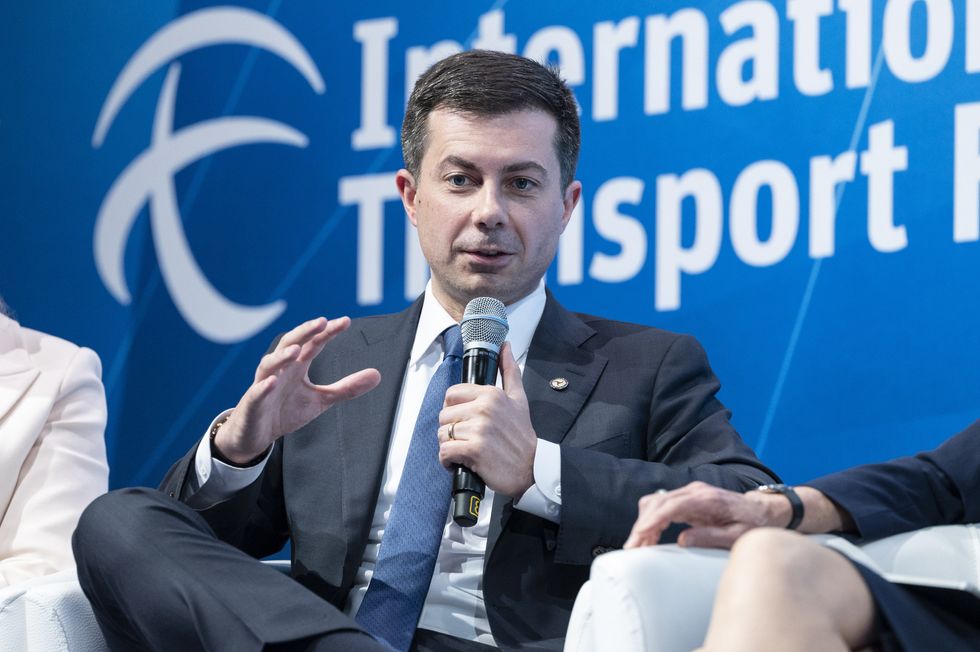
US Secretary of Transportation Pete Buttigieg speaking at the International Transport Forum’s 2022 Summit in Leipzig, Germany, May 18, 2022.
Credit: International Transport Forum
The 42-year-old secretary of transportation is an unlikely choice despite being, in Allen’s words, “a lightning rod for self-harming Republican commentary,” referring to the fact that Buttigieg is often the target of homophobic rhetoric from the right. Buttigieg, a former management consultant who is known for his meticulous challenges to Republican talking points in Congress and on TV, would be the first openly gay veep. But he is an unlikely choice because his appeal is limited to urban liberal voters who are already almost certain to vote for Harris.
Tim Walz
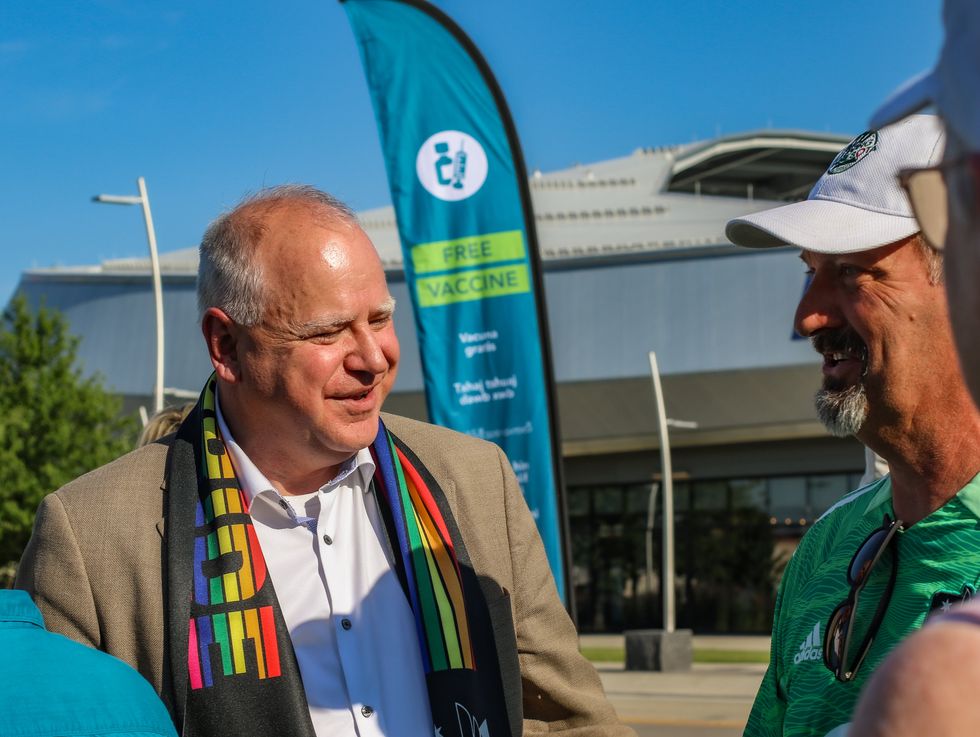
Gov. Tim Walz and St. Paul Mayor Melvin Carter visit the Ramsey County Mobile Vaccine Clinic at Allianz Field in St. Paul, Minn., June 23, 2021.
Credit: Ramsey County Minnesota
The Minnesota governor and veteran of the US Army National Guard has snuck his name onto the list even though he lacks much national recognition. Walz’s efforts to protect abortion rights and his introduction of free school meals for students and gender-affirming care fit nicely with Harris’ policy preferences, and his rural sensibility bodes well with moderate Americans. Plus, Minnesota – once a Democratic stronghold – has been leaning further right in recent years. However, that’s not likely enough to land Walz the VP pick, as neither he nor his state is competitive enough to truly sway this election.
Gretchen Whitmer
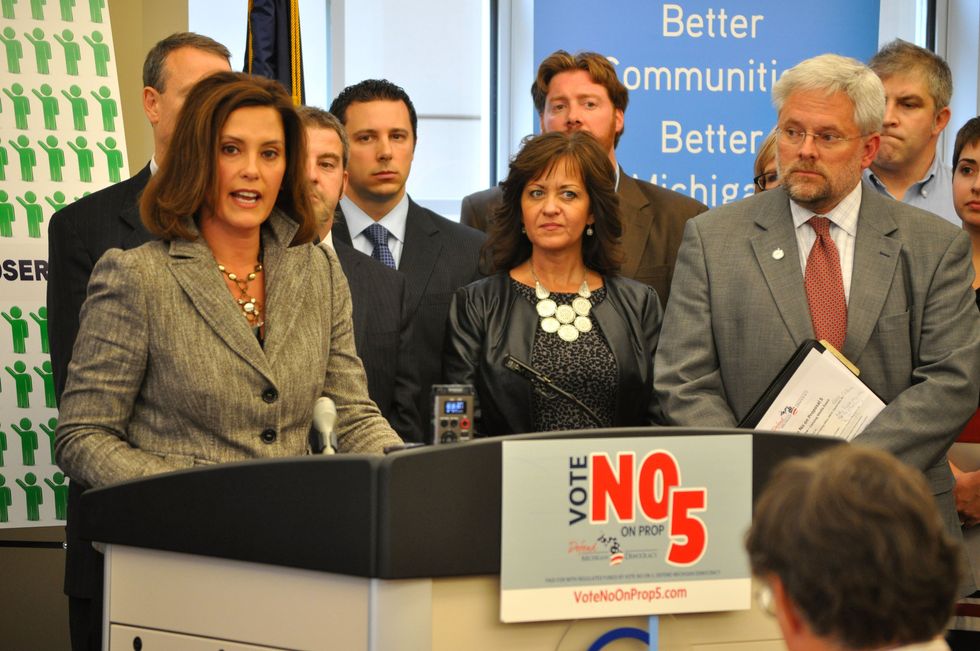
Then-Senator Gretchen Whitmer (L) speaks at a Vote No on Proposal 5 press conference at the Michigan Municipal League offices in Lansing, Oct. 9, 2012.
Credit: Michigan Municipal League
The Michigan governor was rumored as an alternative replacement to Biden but has since endorsed Harris – and is likely waiting for 2028 to throw her hat in the ring. The former senator and prosecutor’s impressive and progressive record aligns with Harris’ as a strong defender of abortion rights, advocate for improved gun legislation, and co-chair of the Biden-Harris campaign. She would be a strong counterweight to the hyper-male Republican bid; however, for a country that has yet to elect a female president, an all-female ticket may be a stretch.
For Allen, “the two most obvious, at least for now, are Arizona Sen. Mark Kelly and Josh Shapiro.” Who do you think she is most likely to choose? Who do you think she should pick? Let us know here
- The importance of Kamala Harris ›
- Generational showdown: How the youth and senior votes will influence the US election ›
- Kamala Harris narrows the enthusiasm gap. But will it last? ›
- Kamala Harris faces a big decision ›
- Kamala Harris secures the Democratic Party’s presidential nomination ›
- What Tim Walz adds to Kamala Harris' campaign - GZERO Media ›
Tuesday, July 30, 2024; Atlanta, Ga; Vice President Kamala Harris speaks during a presidential campaign rally on Tuesday, July 30, 2024
Kamala Harris faces a big decision
Democratic nominee Kamala Harris spent her weekend vetting potential running mates for vice president, and she will hold a rally with her choice on Tuesday in Philadelphia. The political betting machine is in overdrive.
Leading the pack are Gov. Josh Shapiro of Pennsylvania, Sen. Mark Kelly of Arizona, and Gov. Tim Walz of Minnesota. All three met with Harris Sunday for what was described as a “chemistry test.”
Shapiro won his crucial swing state by nearly 15 points in 2022, and a Bloomberg News/Morning Consult poll rated him highly among swing-state Democrats. But Shapiro has his detractors, including Pennsylvania Sen. John Fetterman, who is concerned about the governor’s “personal ambitions,” as well as those who have questioned his support for Israel in the war against Hamas. Nonetheless, Eurasia Group’s Jon Lieber says he “Probably makes the most sense electorally.”
Kelly is a popular senator from another crucial swing state, as well as a former NASA astronaut, Navy captain, and the husband of former Rep. Gabby Giffords, who survived an assassination attempt. He has a strong record on border issues but is not embraced by organized labor.
Walz, meanwhile, brings a background as a teacher, coach, congressman, and National Guard member. He is seen as amiable and relatable, and his former NRA membership could appeal to Republican-leaning independents. Lieber says he’s “not as well known nationally, but name recognition will be a challenge for anyone.”
Dark horses in the race include one of Harris’s former rivals from 2020, Transportation Sec. Pete Buttigieg. Buttigieg’s husband Chasten Buttigiegheadlined a sold-out fundraiser on Friday night with Harris’s husband, Doug Emhoff, raising $321,000 and fueling speculation of a “test run” for his candidacy.
Who’s your money on? Write us with your thoughts here.
.
Will Kamala Harris’ momentum last in the race against Trump?
Jon Lieber, Eurasia Group's head of research and managing director for the firm's coverage of United States political and policy developments, shares his perspective on US politics from Washington, DC.
What we're watching in US Politics: Kamala Harris is off to a blazing start since replacing Joe Biden as the Democrats' pick for the presidential race, raking in almost $250 million in just one week. The big question: Can she maintain this momentum in the race against Donald Trump?
Joe Biden drops out of the race last Sunday, unexpectedly, as the oldest candidate ever, instantly making Donald Trump the new oldest nominee in American presidential history. Now he's going to have to run against a Democrat who's 19 years younger than he is, and the sitting Vice President of the United States, Kamala Harris. She's off to a scorching hot start raising almost $250 million, a quarter of a billion dollars in a single week since Biden announced he was dropping out, and she's picking up a lot of buzz and excitement online.
But the real question is, is her current momentum about Harris? Or, is it just about someone other than Biden? That's really what the rest of this campaign is going to be about. Harris comes in with some strengths that Biden didn't have, namely the fact that three-quarters of the population doesn't think she's too old to be president, but she probably also has some weaknesses where Biden had unique strengths, such as his strength with working-class white voters in the Midwest. On that front, Harris is just kind of an unknown.
We can't really trust what the polls are telling us just yet, because what you'd expect to see after a big event would be a surge in support from Democrats, who are more eager to respond to polls at the moment, so it might be a few weeks before we actually have an understanding of where this race stands in public opinion polling. Then there's the question of Harris herself who hasn't really done much to distinguish herself as vice president and ran a pretty poor presidential primary campaign in 2020 that led to her dropping out and becoming the vice-presidential pick. So is this election going to be about Harris, the person, versus Donald Trump, who Americans know and either love or hate very well? Or is it going to be about Kamala Harris, the meme, running against Donald Trump?
Right now, she's polling as a generic Democrat would, doing two to four points better than Biden would nationally. We don't really have a lot of granularities on what's happening at the swing states, but it looks like this is starting to be a competitive race, and we have to see how Harris holds up once the American people get a better look at her. This is going to happen through her campaign appearances, which will be tight and scripted, but probably the most important event coming up on the election calendar is going to be the debate, where Harris won't have a chance to answer scripted questions or read off a teleprompter and is going to have to face Donald Trump live.
As for Trump, suddenly, this race that was breaking strongly in his favor is now sort of starting to turn against him because of the fact that Kamala Harris now can position herself as the change candidate, and talking about a break from the past, as Trump as the old former president that Americans maybe want to move on from. So very fluid dynamic in the race. Trump is probably still favored, just because he has more paths to victory through the Electoral College, but this could all change drastically over the coming weeks. Thanks for watching, and stay tuned for what we're watching in US politics next week.
- Harris and Trump plot new campaign strategies ›
- Harris makes her campaign debut ›
- What Kamala Harris means for AI ›
- Hard Numbers: The Kamala Harris Edition ›
- With Biden out, can Kamala Harris defeat Trump? ›
- Harris, Trump and the hypocrisy in US politics - GZERO Media ›
- DNC Night 2: Obama set to rally support for Harris - GZERO Media ›
- Harris lays out her vision for America: ‘Write the next great chapter’ - GZERO Media ›
Vice President Kamala Harris speaks at the Harris for President Campaign Rally on Tuesday July 23, 2024 at West Allis Central High School in West Allis, Wis.
Obamas endorse Kamala Harris for president
Barack and Michelle ObamaendorsedKamala Harris as the Democratic nominee for US president on Friday, joining other high-profile Democratic Party leaders in backing the vice president’s bid for the White House.
“We called to say Michelle and I couldn’t be prouder to endorse you and to do everything we can to get you through this election and into the Oval Office,” the former president told Harris.
The announcement capped a big first week for Harris. Her campaign raised a whopping $231 million in just a few days, and Harris has already started to narrow Donald Trump’s lead in key swing states. Although she is still behind in four of the five states, she has substantiallyclosed the gap left by President Joe Biden.
Trump’s biggest lead is in Arizona, where he stands 5 points above Harris. But when Biden was the nominee, Trump was ahead by 10 points. The former president is now ahead of Harris by only 2 points in Georgia and Pennsylvania; by 1 point in Michigan; and in Wisconsin, the candidates are tied.
As Harris narrows the gap, she is alsobreaking fundraising records and galvanizing youth voters. But it is too soon to tell whether this momentum is sustainable or just a short-term swell of enthusiasm following Biden’s decision to exit the race.
_____
Interested in who Harris might choose as her vice-presidential running mate? Click here to learn about the contenders.
Who will Harris choose as her vice president?
Vice President Kamala Harris is on track to replace President Joe Biden as the Democratic nominee, leaving one major question remaining: Who will she choose as her number two?
"Harris needs someone who compliments her strengths,” says Eurasia Group’s US director Clayton Allen. “To put it bluntly, a white, male, moderate.” She is also looking for someone who can unify the party, draw in a new coalition of voters, or win in a swing state.
Former Attorney General Eric Holder is reportedly in charge of vetting a list of 10 Democrats being considered for the job.
The names getting the most buzz:
Josh Shapiro: The Pennsylvania governor, a can-do moderate, could help Harris win his state’s 19 electoral college votes by making inroads with rural, potentially Trump-leaning voters. A poll earlier this year showed that more than three in 10 Trump supporters in Pennsylvania supported Shapiro.
Shapiro, who is Jewish, has been an outspoken supporter of Israel’s policy in Gaza and an opponent of campus protests and divestment calls. The extent to which those stances could alienate progressive Democrats is an open question. Shapiro’s support for school vouchers also ran afoul of Pennsylvania’s largest teachers union, an issue that will likely also attract attention.
Mark Kelly: Like Shapiro, the Arizona Senator also hails from a swing state, and his tough stance on border security could help Harris – who was given the southern border as a portion of her issue portfolio – withstand attacks on the administration’s border record. Plus, “he has a nice story,” says Eurasia Group US expert Jon Lieber. “He’s an astronaut and loyal husband to his wife, who was a victim of gun violence.” Kelly is married to former congresswoman Gabrielle Giffords, who was severely wounded in a mass shooting in Tucson in 2011.
His downside: If he ran it would mean abandoning a Democratic Senate seat in a swing state, forcing the Dems to defend it again two years earlier than expected.
In the middle of the pack …
Andy Beshear: The governor of Kentucky “brings a southern state moderate appeal that boosts Harris’s blue-collar appeal,” says Allen. Beshear has won two terms in a solidly Republican state that Trump won by 26 points in 2020. He is vocal about his Christianity and has emphasized the need to work with Republicans on legislation – traits that could boost Democratic support among moderates and independents. But Trump is almost certainly going to win in Kentucky, putting Beshear at a disadvantage to the other swing-state governors.
Roy Cooper: At 67, Cooper has had a long political career as the former state’s attorney general and North Carolina senator, making him among the most qualified of the VP picks – but age has proven to be a double-edged sword in this election season. Cooper’s successes as a Democratic candidate in an increasingly Republican state may sweeten his odds for VP in helping turn the Tar Heel State, a key battleground state, blue for the first time since 2008.
JB Pritzker: The Illinois governor’s family owns the Hyatt hotel chain, and his deep pockets could help Harris raise money – though having received a $100 million money shower after Biden stepped down, the vice president isn’t exactly desperate for cash. Pritzker, who is also Jewish, has been more moderate on the Gaza issue than Shapiro. But as a 1-percenter, Pritzker won’t help Harris connect with the working-class midwestern Biden-2020 voters she needs, says Lieber. And Illinois isn’t a state in danger anyway: Biden won it by 17 points.
At the bottom of the list …
Pete Buttigieg: The 42-year-old secretary of transportation is an unlikely choice despite being, in Allen’s words, “a lightning rod for self-harming Republican commentary,” referring to the fact that Buttigieg is often the target of homophobic rhetoric from the right. Buttigieg, a former management consultant who is known for his meticulous challenges to Republican talking points in Congress and on TV, would be the first openly gay veep. But he is an unlikely choice because his appeal is limited to urban liberal voters who are already almost certain to vote for Harris.
Tim Walz: The Minnesota governor and veteran of the US Army National Guard has snuck his name onto the list even though he lacks much national recognition. Walz’s efforts to protect abortion rights and his introduction of free school meals for students and gender-affirming care fit nicely with Harris’s policy preferences, and his rural sensibility bodes well with moderate Americans. Plus, Minnesota – once a Democratic stronghold – has been leaning further right in recent years. However, that’s not likely enough to land Walz the VP pick, as neither he nor his state is competitive enough to truly sway this election.
Gretchen Whitmer: The Michigan governor was rumored as an alternative replacement to Biden but has since endorsed Harris – and is likely waiting for 2028 to throw her hat in the ring. The former senator and prosecutor’s impressive and progressive record aligns with Harris’s as a strong defender of abortion rights, advocate for improved gun legislation, and co-chair of the Biden-Harris campaign. She would be a strong counterweight to the hyper-male Republican bid; however, for a country that has yet to elect a female president, an all-female ticket may be a stretch.
For Allen, “the two most obvious, at least for now, are Arizona Sen. Mark Kelly and Josh Shapiro.” Who do you think she is most likely to choose? Who do you think she should pick? Let us know here.
Sen. JD Vance addresses the 2024 Conservative Political Action Conference in February 2024.
Who is JD Vance, Trump’s VP pick?
Updated July 15: JD Vance will be the Republican nominee for Vice President.
From holler to white collar. That’s the unusual life arc of J.D. Vance, the 39-year-old junior senator from Ohio.
Born into extreme poverty in rural southern Ohio, he grew up in the holler – “the hollow” – surrounded by abuse, addiction, and despair. But he made it out: He joined the Marines, graduated from Yale Law School, and became a successful tech venture capitalist.
He recounted all of this in his bestselling 2016 memoir “Hillbilly Elegy,” which became required reading after Trump’s shock victory over Hillary Clinton spurred interest in the disaffection of white working-class America. In the book, Vance criticized a culture of victimhood and dependency among poor whites while also blasting the establishment’s condescension and neglect.
Initially a fierce critic of Trump – he once called the 45th president “unfit,” and his Indian-American wife criticized Trump’s racist language – he had changed his views by the time he ran for Senate in 2022. Vance broadly supports Trump’s populist challenge to the traditional bipartisan establishment and has said Trump’s legally disproven claims of fraud in the 2020 election had political merit.
What are Vance’s policy views? He wants to slash immigration, raise tariffs, and increase the minimum wage to boost employment, industry, and productivity among the US working class. He is certainly no old-school “limited government, free trade” Republican.
He is socially conservative – he favored a national 15-week abortion ban, although he softened his view when his own constituents voted strongly against it. Echoing Trump, he says he supports access to mifepristone, the “abortion pill.”
On foreign policy, he says he is a “realist,” willing to deal with countries based on American interests. He considers China a bigger threat than Russia and wants to cut support for Ukraine, where he seeks a settlement along current front lines that includes sovereignty, US security assistance, and neutrality for Ukraine.
He has strong support from the MAGA wing of the Republican Party, which wants to leave the traditional GOP behind.
Why would Trump choose him? “To bolster his standing with persuadable Republicans who dislike Trump’s personality but love his policy,” says Clayton Allen, a US politics expert at Eurasia Group. “And because he’d gamble that Vance’s naked ambition can be held in check long enough not to cause problems.”
What else to read: For a good one-stop look at what J.D. Vance believes, check out this Q&A by the Times’ Ross Douthat on “What J.D. Vance Believes.” And to learn about Trump’s other possible VP picks, check out our Veepstakes series here.Entertainer and convention speaker Amber Rose stands at the podium ahead of the Republican National Convention in Milwaukee, Wisconsin, U.S., July 14, 2024.
What’s on tap for the Republican National Convention?
The RNC Convention opens Monday in Milwaukee, WI, and we’ll be watching from Day One to see the moment when Trump unveils his running mate. Observers are betting that Sen. JD Vance, of Ohio, has the inside track because Donald Trump Jr. – a big Vance fan – is reportedly scheduled to speak right before the official VP pick, rumored to be on Day Three.
Other politicians on the roster to speak include former GOP presidential candidates Ben Carson, Vivek Ramaswamy, and Sen. Marco Rubio, Gov. Ron DeSantis ofFlorida, Rep. Matt Gaetz of Florida, and Rep. Marjorie Taylor Greene of Georgia. Notably absent from the list is Trump’s chief former rival for the GOP nod, Nikki Haley.
Family speakers include both Trump sons, Donald Jr. and Eric Trump, but not daughters Ivanka Trump and Tiffany Trump, or wife Melania Trump, who will however make a rare public appearance at the event. And no convention would be complete without star power:Celeb speakers include media personality Tucker Carlson, rapper Amber Rose, UFC CEO Dana White, and reality star Savannah Chrisley.
Attendees also will be treated to multiple advance screenings of the biopic “Reagan,” starring Dennis Quaid as the late president, slated for general release on Aug. 30. Fun fact: Quaid also played US President Bill Clinton in HBO’s 2010 drama“The Special Relationship,” about Clinton’s relationship with UK PM Tony Blair.
We’re watching what the convention-goers say about this weekend’s assassination attempt, and what Trump’s pick for VP says about his campaign priorities.

